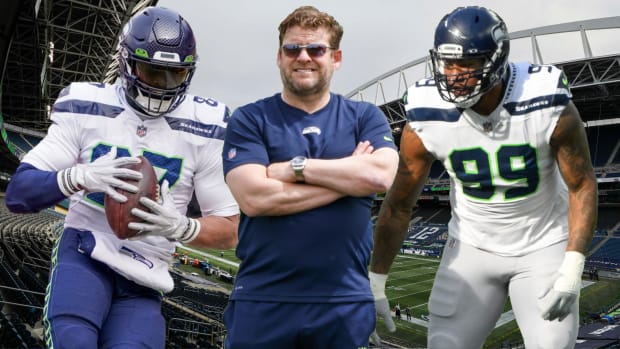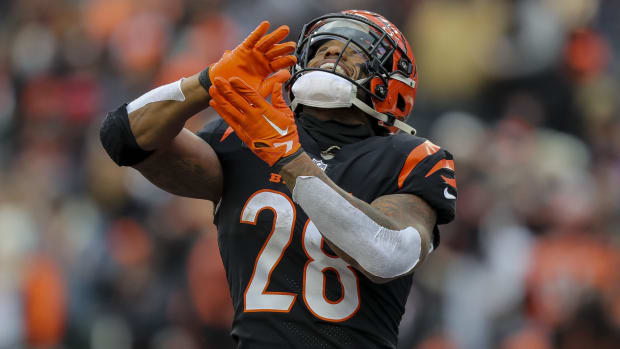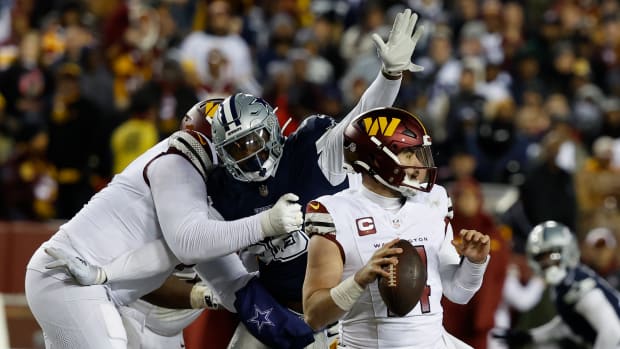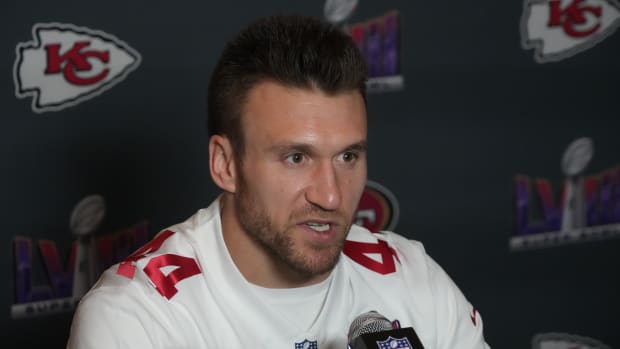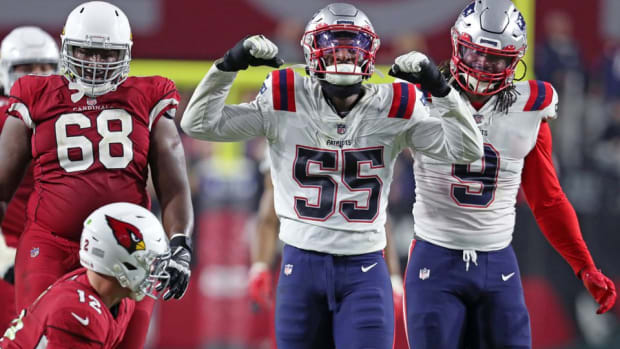‘When They Don’t Know Who You Are, All You Are Is Black’
Bass, who’s competing for a job on the Bears’ D-line, says he gets stopped regularly by police when he returns to his hometown. (Nam Y. Huh/AP)
CHICAGO — Last season there were just under 30 NFL players who graduated from Missouri high schools. Five of them hail from St. Louis, including Pro Bowl safety Jairus Byrd and 2013 defensive rookie of the year Sheldon Richardson. And one of those five, Bears defensive end David Bass, grew up six miles away from the neighborhood where Michael Brown was shot and killed by a police officer, flash-boiling long simmering tensions between local law enforcement and the predominantly black community.
Bass, who was drafted by the Raiders in the seventh round a year ago, watched the drama of mass protests, arrests and looting unfold on his Instagram feed. There were local rappers laying down police diss tracks, photos of looted stores and news of friends being arrested as police in riot gear combed the city in the days following the killing. A graduate of Missouri Western with a degree in criminal justice, Bass seemed to The MMQB well suited to discuss the relationship between the people of Ferguson and its police force.
“First of all,” says Bass, who grew up in University City, “St. Louis isn’t that big. When people say Ferguson, Missouri, we don’t really think of it like that. It’s St. Louis. As a community Ferguson isn’t a bad place to grow up. It’s not the east side, with the gang violence and the killing. Ferguson used to be all white, but blacks from all over town started moving out of poorer neighborhoods into north county areas like Ferguson. There’s a lot of diversity now, with white and black people living side by side. The police stayed white, though.”
Bass visited his alma mater, Missouri Western, in June. (The St. Joseph News-Press, Sait Serkan Gurbuz/AP)
According to recent survey data, 22% of Ferguson residents live below the poverty line. Bass, who grew up just to the south, on the other side of I-70, was raised alongside a younger brother by a single mom—his father died when he was seven. As a teenager he learned to fear the police after an incident at The Loop, a popular cluster of shops and restaurants in his hometown.
“People don’t trust the police where I’m from. They’re hated,” Bass says. “I was 15 and one of my best friends had just got a car from his mom, a white Lincoln, and he picked up my brother and I to go to The Loop. When we parked there were police behind us, and next thing you know, there are about 10 police cars surrounding us. They’re screaming, ‘Stay in the car! Keep your hands up! Hand over your IDs.’ People are starting to gather to watch. They took 45 minutes searching the car while we sat on the sidewalk.
“Finally, they said three black males robbed a store in The Loop and drove away in the same model car. Tell me this: If we robbed the store, why would we go back and park in The Loop?”
Bass majored in criminal justice at Missouri Western and aspired to become a crime scene investigator if football didn’t work out. Instead he became the first MWSU football player invited to the NFL combine a year ago. The Bears signed him after he was waived by Oakland on Aug. 31, and he played 12 games for Chicago. With his rookie earnings he bought a black Dodge Durango and drove it between Chicago and St. Louis during breaks. He says the police harassment has intensified in adulthood.
“When I go home I get pulled over just because,” Bass says, “and they’ll say, ‘We’re doing random checks,’ which is against the law. Or they say, there was a theft and the getaway car was like my black Durango. When they don’t know who you are, all you are is black. They don’t know that I graduated from college, or that I’m in the NFL. But when they find that out, they want to stop and have a conversation.”
When I go home I get pulled over just because. It’s about the way they look at you, the way they talk to you. Like you don't matter.
Bass recounts an incident from just before minicamp in June at a St. Louis nightclub. He, his girlfriend, brother, cousin and a friend were out in Ballpark Village, near Busch Stadium, with plans to enter the club. Three of them went in, but the cousin was turned away upon entrance by a white bouncer without explanation. Protests from Bass's girlfriend and brother led to her being forcibly pushed out. Bass and his friend were about to gain admittance through another entrance when a manager emerged to tell him that his friend wasn't welcome. Bass says the friend was told by a manager, "We don't want your kind in here starting trouble." Bass says he started receiving frantic texts from his girlfriend, and they met to share stories. They took the account of Bass's girlfriend being pushed to police.
"They took one look at us and took the club’s side,” he says.
“It’s about the way they look at you, the way they talk to you. Like you don’t matter. Like you have nothing going for you in life.
"I can't sit here and justify Michael Brown's actions, because I don't know what he did leading up to his death. But I know that police cannot shoot unarmed men, and the reason you have the violent reaction from the community is the violent, aggressive and disrespectful way policing is done in the St. Louis area."’
* * *
FOOTBALL IN FERGUSON
Robert Klemko on a high school team trying to ready itself for the season in the midst of civic chaos. FULL STORY
There is, in every NFL locker room, an abundance of such stories. When black NFL players return to their hometowns driving and wearing the spoils of their new wealth, many profess to being targets of racial profiling. In Bass’s mind, that brand of harassment and those dehumanizing glares create the kind of blind rage and violent opportunism that we’ve seen in Ferguson, set off by one instance of alleged injustice. Ferguson was a gasoline-soaked woodpile before Michael Brown, just waiting for a spark.
“I’m all for the peaceful demonstrations,” Bass says. “But a lot of our youth looted. They trashed the Quik Trip, Walmart, Target, Foot Locker. They’re robbing people like it’s a way out in this time of crisis, but it’s really a sign of weakness and impatience, and for a lot of people it justifies the way we’re being harassed and profiled.
“As far as I can see, there’s no end to it.”




































